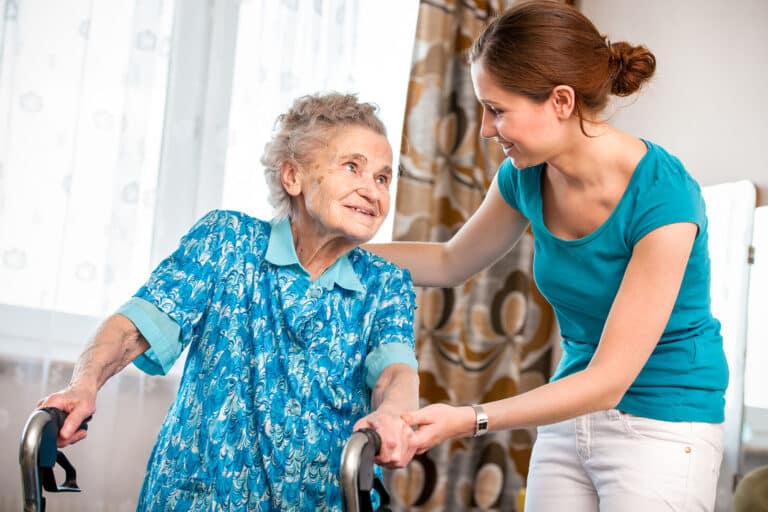One of the most common fears in the later years is falling, which might make loved ones, and seniors wonder if there are signs that indicate an issue with balance before a fall occurs. The answer is often yes; there may be signs that loved ones, seniors, and senior home care might notice. Recognizing these and addressing balance concerns before a fall is essential for avoiding injuries and preserving independence.
Subtle Signs of Balance Problems
Falls may appear sudden, but they are rarely without warning. Seniors may show indicators of balance instability long before a fall. Here are several important signs that senior home care and loved ones can watch out for:
- Frequent Stumbles: Tripping on small things or uneven surfaces may indicate a lack of coordination or foot placement awareness.
- Dizziness or Lightheadedness: Feeling dizzy, particularly while moving from sitting to standing, can indicate inner ear problems, blood pressure fluctuations, or other medical diseases that influence balance.
- Hesitant Movement: Seniors who appear careful or deliberate when walking or climbing stairs may be compensating for a feeling of imbalance.
- Dependence on Furniture: Holding onto walls or furniture for support when walking indicates a lack of stability and trust in one’s ability to move independently.
- Shuffling Steps: Changes in walking patterns, such as shorter strides or shuffling, often occur when balance and leg strength are compromised.
- Fatigue or Muscle Weakness: Consistently feeling fatigued after minimal exertion may signal that maintaining posture and mobility is becoming more difficult.
Common Causes of Balance Problems
Understanding the underlying causes of balance issues might help guide treatment. If senior home care or loved ones notice any of the above signs, they should encourage seniors to talk with their medical team, as one or more of the following things might be the culprit:
- Inner Ear Disorders: The vestibular system, located in the inner ear, is essential for maintaining balance. Vertigo and Meniere’s illness are two conditions that might cause problems with this system.
- Neurological Conditions: Disorders including Parkinson’s disease and peripheral neuropathy disrupt nerve signals to the muscles, causing instability.
- Muscle Weakness and Joint Problems: Loss of muscle mass with age, as well as joint deterioration, can impede movement and balance.
- Medication Issues: Some medications include adverse effects such as dizziness or sleepiness, which can impair coordination.
- Vision Impairment: Clear eyesight allows seniors to evaluate distance and avoid hazards. Unfortunately, visual changes that often come with aging can impair this skill.
Preventative Steps and Interventions
If balance concerns are suspected, it is essential for senior home care and loved ones to act quickly to avoid falls and possible injury. Some of the steps that may be taken include the following:
- Consult a Healthcare Professional: A primary care physician, physical therapist, or specialist can evaluate balance and offer treatments like vestibular therapy or assistive devices.
- Encourage Balance Exercises: Tai chi, yoga, and certain physical therapy routines can all help to strengthen muscles and improve coordination.
- Review Medications: Seniors should talk with their healthcare practitioner on a regular basis to check that their drugs are not causing dizziness or instability.
- Modify Living Spaces: To make the environment safer, it’s important to remove tripping risks, install grab bars, and guarantee sufficient lighting.
Senior home care and loved ones can work together to ensure seniors’ balance issues are recognized early and addressed to ensure their safety and improve their quality of life. Not only that, but proactive steps increase confidence and independence in daily tasks, all of which are key for seniors to continue living independently.
If you or an aging loved one are considering Senior Home Care in Town and Country, MO, please contact the caring staff at Pear Tree Home Care today! (314) 942-9411
Pear Tree Home Care Provides Senior Home Care Services in St. Louis, Ladue, Chesterfield, Town and Country, Clayton, Des Peres, St. Charles, Wildwood, Brentwood, Maryland Heights, Lake St. Louis, O’Fallon, Kirkwood, Webster Groves, Arnold, Oakville, Mehlville, Creve Coeur, St. Louis City, St. Louis County, St. Charles County, Franklin County, Warren County, Jefferson County, and surrounding areas.
Sources:
- https://www.nia.nih.gov/health/falls-and-falls-prevention/older-adults-and-balance-problems
- https://www.mayoclinic.org/diseases-conditions/balance-problems/symptoms-causes/syc-20350474
- https://my.clevelandclinic.org/health/diseases/21021-balance-problems
At Pear Tree we’re innovators. Our goal, to create a family of caregivers looking to provide a one of a kind experience to our clientele.
In 2016, our founders noticed a key problem in home care industry that everyone seemed to be ignoring.
It’s too systematic. Home care isn’t one size fits all. Just like people aren’t one size fits all.
That’s where Pear Tree comes in.
We yearn for you to have the best possible care for your loved ones and the peace of mind that comes with knowing they aren’t only in good hands. They’re in great hands. Because, in the end, that’s what we’d want for our family.
It’s proven. When the home care experience is immersive and personalized, you’re going to produce better success rates with healthier family members.
Please, join us in our journey of revolutionizing the home care industry and creating lasting relationships along the way.
This is not the first Home Care agency for Pat, she was the Director of nursing for Kimberly Nurses in 1980 and after the tragic passing of the companies president she opened and co-founded American Nursing Resources Home Health Agency. Pat opened and passed Medicare certification for ANRHHA Clayton and Washington, MO offices.
For Zachary, the name “Pear Tree” is a tribute to his beloved late friend; Wade Abbadessa. Wade worked at his family’s famous restaurant “The Pear Tree” in Macon, until his tragic death in September 2014. Wade lost his battle with a rare form of bone cancer at the young age of 26. His legacy will live on through our company.
- How Home Care Supports Seniors’ Emotional Well-Being - May 23, 2025
- Alzheimer’s Care: Helping Seniors Maintain Their Daily Routine - May 7, 2025
- Helping Seniors Navigate Stairs - April 28, 2025






